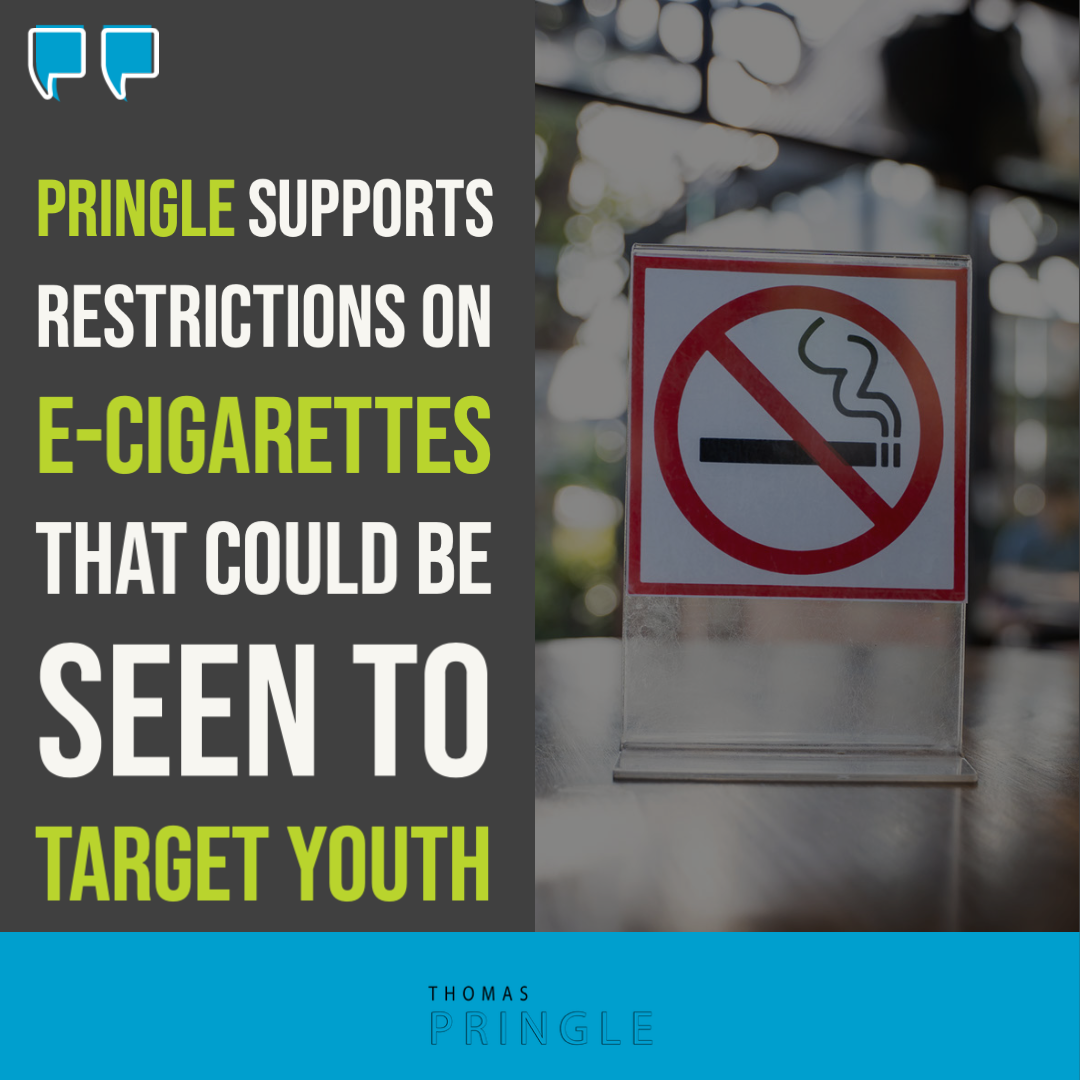- Pringle: We need a policy that recognises the importance of inshore fishing
- Pringle: Disabled people and carers face crisis of State neglect
- Pringle: Failed FF/FG housing policies forcing people to put their lives on hold
- Pringle welcomes Donegal council motion on Occupied Territories Bill: ‘We cannot stand by in the face of genocide’
Pringle supports restrictions on e-cigarettes that could be seen to target youth
- Updated: 16th June 2023

Independent TD for Donegal, Thomas Pringle, said Government should restrict flavours, packaging and advertising for e-cigarettes that could be seen to target younger people.
Addressing the Dáil today, Deputy Pringle said he supported the introduction of a licensing system for the sale of tobacco and nicotine inhaling products, such as e-cigarettes.
Deputy Pringle said: “I welcome the proposed restrictions on sales of these products, including banning sales from mobile premises and vending machines and the prohibition on the sale of e-cigarettes to those under the age of 18.
“I also support a ban on sales of tobacco and e-cigarettes at events aimed at children and a ban on e-cigarette advertising and promotion in certain places, including within 200m of the perimeter of a school and at bus stops or train stations,” he said.
The deputy was speaking in support of the Public Health (Tobacco Products and Nicotine Inhaling Products) Bill 2023. He said the Tobacco-Free Ireland Policy document, developed by the Department of Health in 2013, set a goal that fewer than 5% of people in Ireland would smoke by 2025.
Deputy Pringle said: “Although there was a significant drop from 23% in 2015 to 17% in 2019, this has unfortunately increased again to 18% in 2021, far from the less than 5% target, and demonstrates that we are going in the wrong direction.” He said e-cigarettes were not for sale in Ireland at that time and not accounted for in these targets.
He said further research is needed into the methods the tobacco industry uses to influence public policy across the world and cited a 2000 WHO bulletin that identified tactics used by the industry to resist government regulation of its products.
The deputy said: “It’s important that we protect public health policy from being influenced by industries that profit from harmful products, such as cigarettes and e-products.”
The deputy said: “There is some evidence that e-cigarette usage may actually encourage smoking, particularly among young people. The Health Research Board concluded that teenagers who used e-cigarettes are three to five times more likely to start smoking tobacco cigarettes compared to their peers who had never used them.”
Deputy Pringle said: “I also have serious concerns about the design, flavours and promotion of e-cigarettes to children, that they are targeting young people and teenagers. This bill needs to go a step further and increase restrictions on flavours, packaging and advertising. The Irish Cancer Society have raised concerns that flavours such as bubble gum, strawberry milkshake, tutti-frutti and cola are aimed at adolescents and young people and have said that it is important to regulate flavours which could be seen as targeting younger people.
“The Health Committee also recommended that ‘the bill should regulate the flavouring of e-cigarettes and all flavours, except for tobacco, should be strictly prohibited so as not to entice minors.’ I would agree with that,” he said, adding it was disappointing that this hasn’t been included in the legislation.
He noted that some US jurisdictions are implementing an outright ban on sales or on certain flavours believed to attract young people to vaping. The Australian government has brought in a near total ban, save for smokers who can get one by prescription only, he said, adding that Brazil, Mexico and Singapore have banned e-cigarettes altogether.
Deputy Pringle said: “I welcome this bill but urge that we pay close attention to nicotine products and their impact on our health in the longer term. There are about 300,000 different types of products currently registered with the EU. We need to keep pace with new tobacco and other nicotine products, given the evolving market.”
He also urged Government to consider the Committee’s recommendation that the legislation be reviewed following the first year of enactment.
Deputy Pringle said: “I think there has to be a review mechanism built into the legislation to ensure that reviews take place and actually happen. Because I think that’s one thing we’re very slack on here in Ireland, actually reviewing legislation.”



